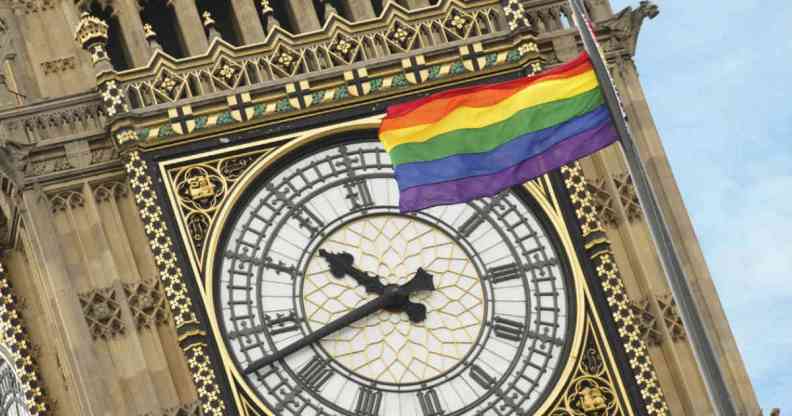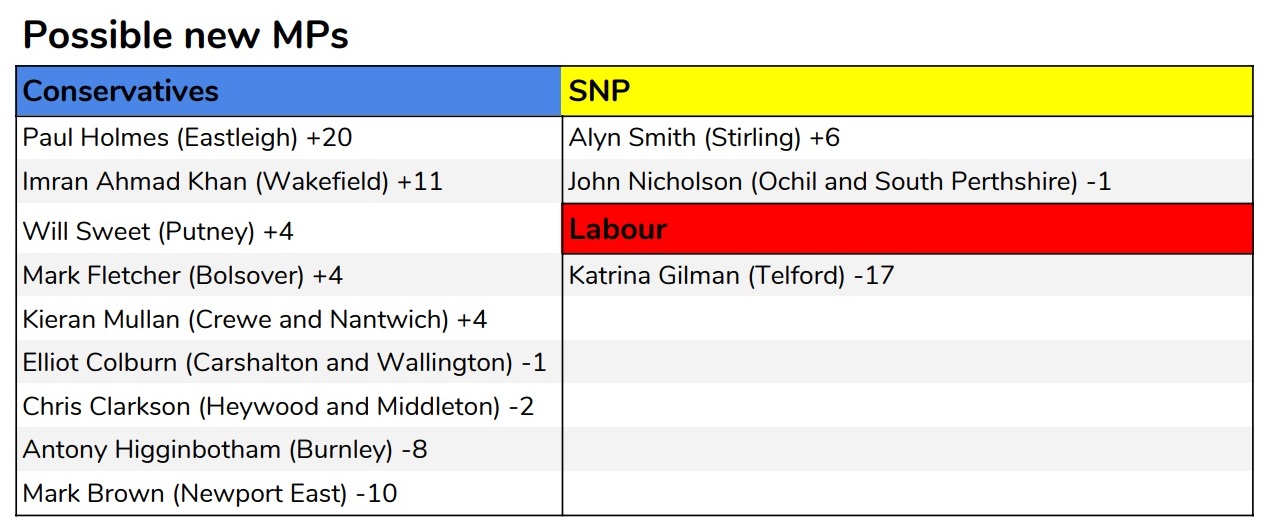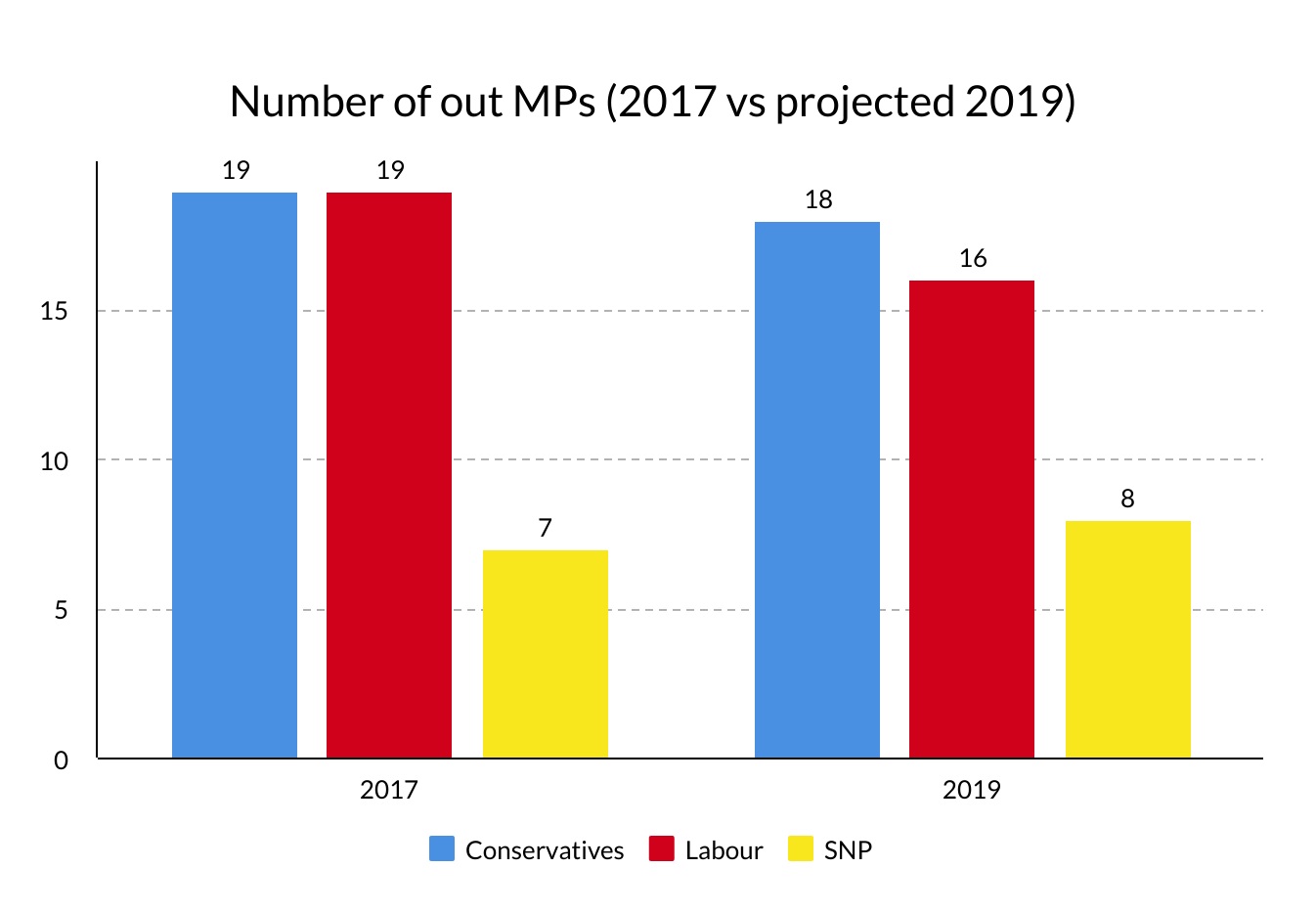The LGBT MPs we’re set to lose, could be about to gain and the ones most likely to hold on after the general election

The UK Parliament still has the highest LGBT+ representation in the world (UK Parliament/Jessica Taylor)
Andrew Reynolds, author of The Children of Harvey Milk: How LGBTQ Politicians Changed the World, has forecast big changes to LGBT+ representation in parliament after the general election.
The last UK parliament had the highest representation of out lawmakers anywhere in the world, with 19 Tories, 19 Labour MPs and seven Scottish Nationalists identifying as LGBT+.
However, the scope of LGBT+ voices in the next parliament will be impacted by the Brexit whirlwind.
Six out Tories are standing down at the election – Justine Greening, Alan Duncan, Ross Thompson, Margot James, Nick Herbert and Nick Boles – alongside one Labour MP, Stephen Twigg.

Six Tories and one Labour MP are not standing for re-election. All the departing Tories, bar one, are from the more moderate remain wing of the party
Incumbent LGBT+ MPs are mostly set to hold on after general election.
Of the 38 remaining incumbents running, 30 are firm favourites to be re-elected.
| Incumbent MPs likely to hold | |
| Labour | Conservatives |
| Angela Eagle (Wallasey) | Daniel Kawczynski (Shrewsbury and Atcham) |
| Clive Betts (Sheffield South East) | Crispin Blunt (Reigate) |
| Nick Brown (Newcastle upon Tyne East) | Conor Burns (Bournemouth West) |
| Dan Carden (Liverpool Walton) | Nigel Evans (Ribble Valley) |
| Stephen Doughty (Cardiff South and Penarth) | Lee Rowley (Dervyshire North East) |
| Nia Griffith (Llanelli) | Mark Menzies (Fylde) |
| Gerald Jones (Merthyr Tydfil and Rhymney) | Nick Gibb (Bognor Regis and Littlehampton) |
| Gordon Marsden (Blackpool South) | Iain Stewart (Milton Keynes South) |
| Luke Pollard (Plymouth Sutton) | SNP |
| Steve Reed (Croydon North) | Hannah Bardell (Livingstone) |
| Wes Streeting (Ilford North) | Mhairi Black (Paisley and Renfrewshire South) |
| Ben Bradshaw (Exeter) | Martin Docherty (West Dunbartonshire) |
| Chris Bryant (Rhondda) | Stuart McDonald (Cumbernauld, Kilsyth and Kirkintilloch) |
| Peter Kyle (Hove) | Stewart McDonald (Glasgow South) |
| Lloyd Russell Moyle (Brighton Kemptown) | Joanna Cherry (Edinburgh South West) |
| Paul Robertson (Banff and Buchan) |
However, three incumbent Labour MPs, five Tories and one SNP MP are vulnerable to a challenge, according to YouGov’s MRP polling model.
Labour MP Ged Killen looks very likely to lose Rutherglen to the SNP, while Cat Smith and Sandy Martin have tough battles to hold Lancaster and Ipswich against the Conservatives.
For the Conservatives, Mike Freer and William Wragg face challenges from the Lib Dems; Stuart Andrew and Damien Moore from Labour, and David Mundell from the SNP – though robustness of the Tory vote bodes well for most of those MPs holding on.
If Lloyd Russell-Moyle is re-elected in Brighton Kemptown on Thursday, he will be the first ever parliamentarian in the world elected while being out about their HIV+ status.
| Vulnerable | |
| Conservatives | Labour |
| William Wragg (Hazel Grove) +9 | Ged Killen (Rutherglen and Hamilton West) -6 |
| Stuart Andrew (Pudsey) +13 | Sandy Martin (Ipswich) -4 |
| Damien Moore (Southport) +15 | Cat Smith (Lancaster and Fleetwood) +3 |
| David Mundell (Dumfriesshire, Clydesdale) +15 | SNP |
| Mike Freer (Finchley and Golders Green) +17 | Angela Crawley (Lanark and Hamilton East) +4 |
New faces.
While established LGBT+ voices are leaving parliament, there are many out candidates with a chance to break through in the new parliament.
There are nine out Conservatives with a shot at entering parliament, two of which (Paul Holmes and Imran Ahmad Khan) are firm favourites to win.
Khan, the candidate in Wakefield, would be the first out LGBT+ MP from a BME background.

Numbers: Projected point lead according to YouGov’s MRP model
Alyn Smith, running for the SNP in Stirling, is also looking like a winner, former SNP MP John Nicolson has an excellent chance winning in Ochil and South Perthshire, and the SNP’s Paul Robertson also is looking at an outside chance in Banff and Buchan.
However, Katrina Gilman, Labour’s one LGBT+ target seat candidate, is a long way behind in Telford.
None of the transgender or non-binary candidates standing are likely to win, while the Liberal Democrats, which had no out MP in the last Parliament, will again be lacking an LGBT+ voice in the House of Commons.
As a whole, it is highly likely that the SNP caucus will increase (perhaps to nearly a quarter of their parliamentary party), Labour will decline and the Tories will stay steady.
The YouGov projections would put the Tories at 18, Labour at 16 and the SNP eight.

Despite the potential changes, odds are that LGBT+ representation in the House of Commons is projected to remain relatively stable
LGBT+ representation in the next House of Commons after the general election could be anywhere between 32 and 51 – but is much more likely to be between 39 and 47.
Andrew Reynolds is Professor of Political Science at UNC Chapel Hill. He tweets at@AndyReynoldsUNC.

